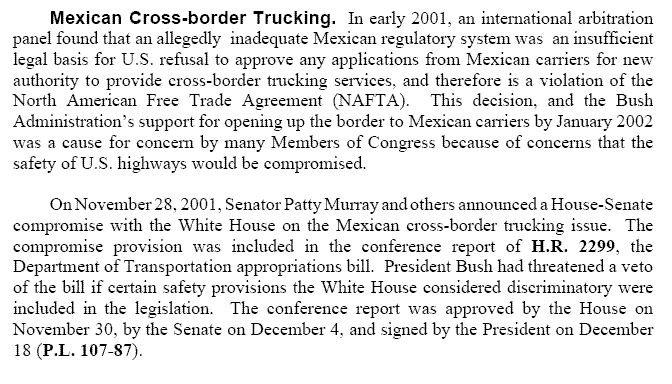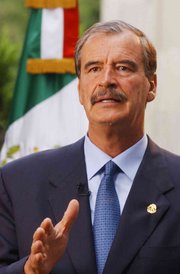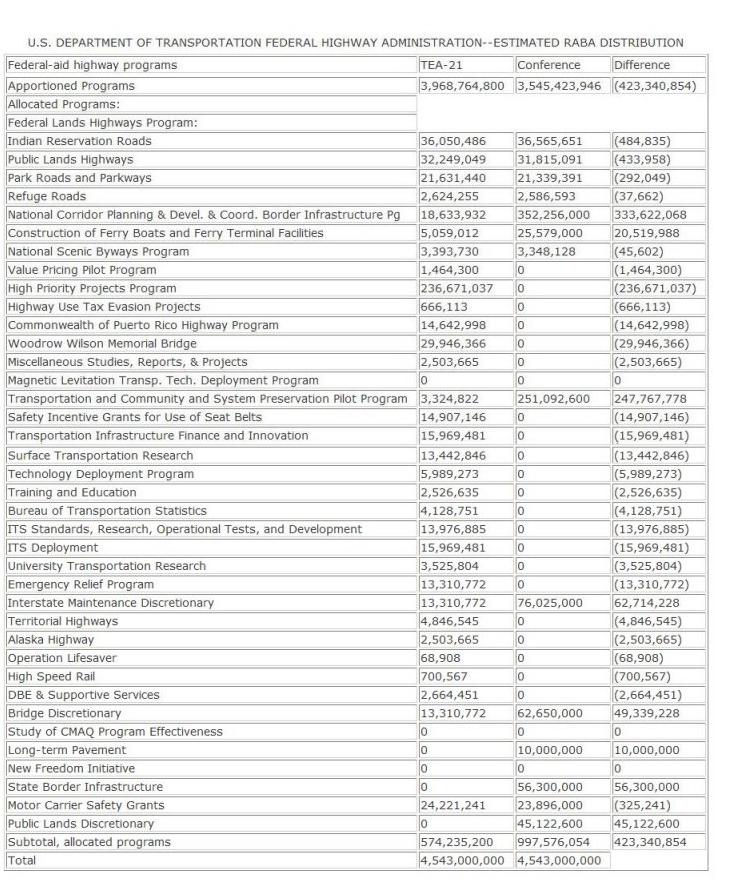|
HOW NAFTA ENDED THE BAN ON
MEXICO'S TRUCKS
From Senator Byron Dorgan's
testimony - Congressional Record - Pages
S7297 &
S7298
The North American Free
Trade Agreement, which went into effect in January 1994,
stipulated that the longtime U.S. restrictions on Mexican
trucks be lifted.
Under NAFTA, by December
1995, Mexican trucks would be allowed to deliver loads all
[Page: S7298]
over the four U.S.
border states--California, Arizona, New Mexico and
Texas--and to pick up loads for their return trip to Mexico.
U.S. trucking firms would get similar rights to travel in
Mexico. And by January 2000, Mexican trucks would be allowed
throughout the United States.
However, bowing to
pressure from the Teamsters union and the insurance
industry, President Clinton blocked implementation of the
NAFTA provisions. The Mexican government retaliated by
imposing a similar ban on U.S. trucks.
As a result, the
longtime status quo continues: Trucks from either side must
transfer their loads to short-haul "drayage'' truckers, who
cross the border and transfer the cargo again to long-haul
domestic trucks.
The complicated
arrangement is time-consuming and expensive.
Mexico estimates its
losses at $2 billion annually; U.S. shippers say they
have incurred similar costs.
In
1998, Mexico filed a formal complaint under NAFTA, saying
the U.S. ban violated the trade pact and was mere
protectionism. The convoluted complaint process lasted
nearly six years, until a three-person arbitration panel
finally ruled Feb. 6 that the United States must lift its
ban by March 8 or allow Mexico to levy punitive tariffs on
U.S. exports.
COMPARING TRUCKING
REGULATIONS
The planned border
opening to Mexican trucks will pose a big challenge to U.S.
inspectors, who will check to be sure that trucks from
Mexico abide by stricter U.S. truck-safety regulations. Here
are some of the differences:
Hours-of-service limits
for drivers--In U.S.: yes. Ten hours' consecutive driving,
up to 15 consecutive hours on duty, 8 hours' consecutive
rest, maximum of 70 hours' driving in eight-day period; in
Mexico: no.
Driver's age--In U.S.:
21 is minimum for interstate trucking; in Mexico: 18.
Random drug test--In
U.S.: yes, for all drivers; in Mexico: no. Automatic
disqualification for certain medical conditions in U.S.:
yes; in Mexico: no.
Logbooks--In U.S.: yes,
standardized logbooks with date graphs are required and part
of inspection criteria; in Mexico: a new law requiring
logbooks is not enforced, and virtually no truckers use
them.
Maximum weight limit (in
pounds)--In U.S.: 80,000; in Mexico: 135,000.
Roadside inspections--In
U.S.: yes; in Mexico: an inspection program began last year
but has been discontinued.
Out-of-service rules for
safety deficiencies--In U.S.: yes; in Mexico: not currently,
program to be phased in over two years.
Hazardous materials
regulations--In U.S.: a strict standards, training,
licensure and inspection regime; in Mexico: much laxer
program with far fewer identified chemicals and substances,
and fewer licensure requirements.
Vehicle safety
standards--In U.S.: comprehensive standards for components
such as antilock brakes, underride guards, night visibility
of vehicle; in Mexico: newly enacted standards for vehicle
inspections are voluntary for the first year and less
rigorous than U.S. rules.
|



